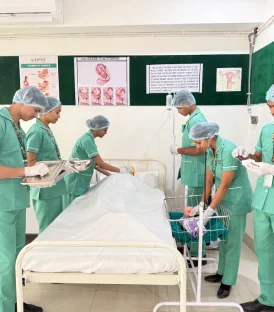September 15, 2025

The hospitality sector in India is becoming one of the major components of the service sector with an ever-increasing impact on economic development and employment. The tourism industry in India is rapidly growing, the disposable income of Indians is increasing, and the globalization of business and leisure travel has raised an ever-increasing demand for professionally trained staff for hotel and hospitality management. This developing demand will provide a firm basis for developing professional educational institutions that can provide a strong academic foundation as well as real-life experiences.
Establishing a hotel management institute franchise in India, then goes beyond an entrepreneurial undertaking to become an institutional development for the national goals of capacity building in one of the fastest-growing sectors. By offering academic courses that are rigorous with some industry links or experience, these institutions can develop the next generation of leaders for this sector.
Step-by-Step Guide to Starting a Hotel Management Institute in India
Incubating a Hotel Management Institute needs more than just the infrastructure. It requires vision, planning, and robust ties with industry. An institute that can develop with a solid balance of compliance, the expectations of higher academic work, and practical experiential training, with a good link to industry, can flourish in this sector. To make the journey clearer, here is a step-by-step guide to starting a hotel management institute in India.
Step 1: Conduct Market Research and Define Your Vision
Start by investigating the demand for hospitality education in your location of choice. Research competing institutions, assess gaps in knowledge and skills, and become familiar with what students expect. Based on that research, you then need to develop the vision of your institution in terms of whether you will run degree programs, diplomas, or short-course certifications.
Step 2: Secure Regulatory Approvals and Accreditation
Compliance is vital for credibility, so obtain necessary permissions from relevant bodies such as the All India Council for Technical Education (AICTE) or achieve affiliation with recognized universities. Most importantly, accreditation is a critical step that ensures your institute is trusted by students, parents, and industry partners.
Step 3: Develop Curriculum and Infrastructure
Design a curriculum that integrates theoretical foundations with practical training in areas such as food production, housekeeping, and front office management. Parallelly, invest in infrastructure, training kitchens, mock reception areas, restaurants, and IT-enabled classrooms that replicate real-world hospitality environments.
Step 4: Recruit Faculty and Build Industry Partnerships
Recruiting faculty who have both education and professional experience is critical to ensuring quality education. In addition, partnerships with hotels, resorts, airlines, and event companies to provide student internships, workshops, and placements will assist students in their degrees.
Step 5: Establish Branding, Outreach, and Student Support
At last, start building your institute's visibility through digital campaigns, school outreach activities, and education fairs. Focus on the institution's unique strengths, including global exposure, guaranteed internships, or specialized training. Combine this with student support services such as career counseling, personality development, and soft skills training for leadership preparation.
Shape Tomorrow’s Hospitality Leaders with DPMI
With years of expertise in skill-based education, DPMI stands as a trusted name in hospitality and allied fields. If you aspire to contribute to this dynamic industry, DPMI can be your partner in creating a high-quality institute that delivers excellence in both learning and placements. Begin your journey with DPMI today and play a pivotal role in shaping the future leaders of hospitality.

















